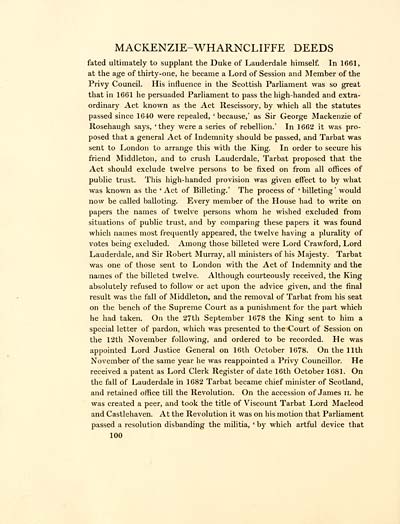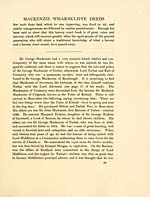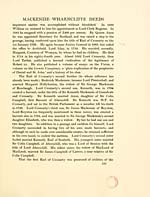Download files
Complete book:
Individual page:
Thumbnail gallery: Grid view | List view

MACKENZIE-WHARNCLIFFE DEEDS
fated ultimately to supplant the Duke of Lauderdale himself. In 1661,
at the age of thirty-one, he became a Lord of Session and Member of the
Privy Council. His influence in the Scottish Parliament was so great
that in 1661 he persuaded Parliament to pass the high-handed and extra-
ordinary Act known as the Act Rescissory, by which all the statutes
passed since 1640 were repealed, ' because,' as Sir George Mackenzie of
Rosehaugh says, 'they were a series of rebellion.' In 1662 it was pro-
posed that a general Act of Indemnity should be passed, and Tarbat was
sent to London to arrange this with the King. In order to secure his
friend Middleton, and to crush Lauderdale, Tarbat proposed that the
Act should exclude twelve persons to be fixed on from all offices of
public trust. This high-handed provision was given effect to by what
was known as the ' Act of Billeting.' The process of ' billeting ' would
now be called balloting. Every member of the House had to write on
papers the names of twelve persons whom he wished excluded from
situations of public trust, and by comparing these papers it was found
which names most frequently appeared, the twelve having a plurality of
votes being excluded. Among those billeted were Lord Crawford, Lord
Lauderdale, and Sir Robert Murray, all ministers of his Majesty. Tarbat
was one of those sent to London with the Act of Indemnity and the
names of the billeted twelve. Although courteously received, the King
absolutely refused to follow or act upon the advice given, and the final
result was the fall of Middleton, and the removal of Tarbat from his seat
on the bench of the Supreme Court as a punishment for the part which
he had taken. On the 27th September 1678 the King sent to him a
special letter of pardon, which was presented to the Court of Session on
the 12th November following, and ordered to be recorded. He was
appointed Lord Justice General on 16th October 1678. On the 11th
November of the same year he was reappointed a Privy Councillor. He
received a patent as Lord Clerk Register of date 16th October 1681. On
the fall of Lauderdale in 1682 Tarbat became chief minister of Scotland,
and retained office till the Revolution. On the accession of James n. he
was created a peer, and took the title of Viscount Tarbat Lord Macleod
and Castlehaven. At the Revolution it was on his motion that Parliament
passed a resolution disbanding the militia, ' by which artful device that
100
fated ultimately to supplant the Duke of Lauderdale himself. In 1661,
at the age of thirty-one, he became a Lord of Session and Member of the
Privy Council. His influence in the Scottish Parliament was so great
that in 1661 he persuaded Parliament to pass the high-handed and extra-
ordinary Act known as the Act Rescissory, by which all the statutes
passed since 1640 were repealed, ' because,' as Sir George Mackenzie of
Rosehaugh says, 'they were a series of rebellion.' In 1662 it was pro-
posed that a general Act of Indemnity should be passed, and Tarbat was
sent to London to arrange this with the King. In order to secure his
friend Middleton, and to crush Lauderdale, Tarbat proposed that the
Act should exclude twelve persons to be fixed on from all offices of
public trust. This high-handed provision was given effect to by what
was known as the ' Act of Billeting.' The process of ' billeting ' would
now be called balloting. Every member of the House had to write on
papers the names of twelve persons whom he wished excluded from
situations of public trust, and by comparing these papers it was found
which names most frequently appeared, the twelve having a plurality of
votes being excluded. Among those billeted were Lord Crawford, Lord
Lauderdale, and Sir Robert Murray, all ministers of his Majesty. Tarbat
was one of those sent to London with the Act of Indemnity and the
names of the billeted twelve. Although courteously received, the King
absolutely refused to follow or act upon the advice given, and the final
result was the fall of Middleton, and the removal of Tarbat from his seat
on the bench of the Supreme Court as a punishment for the part which
he had taken. On the 27th September 1678 the King sent to him a
special letter of pardon, which was presented to the Court of Session on
the 12th November following, and ordered to be recorded. He was
appointed Lord Justice General on 16th October 1678. On the 11th
November of the same year he was reappointed a Privy Councillor. He
received a patent as Lord Clerk Register of date 16th October 1681. On
the fall of Lauderdale in 1682 Tarbat became chief minister of Scotland,
and retained office till the Revolution. On the accession of James n. he
was created a peer, and took the title of Viscount Tarbat Lord Macleod
and Castlehaven. At the Revolution it was on his motion that Parliament
passed a resolution disbanding the militia, ' by which artful device that
100
Set display mode to:
![]() Universal Viewer |
Universal Viewer | ![]() Mirador |
Large image | Transcription
Mirador |
Large image | Transcription
Images and transcriptions on this page, including medium image downloads, may be used under the Creative Commons Attribution 4.0 International Licence unless otherwise stated. ![]()
| Histories of Scottish families > Ancient deeds and other writs in the Mackenzie-Wharncliffe charter-chest > (128) Page 100 |
|---|
| Permanent URL | https://digital.nls.uk/95524901 |
|---|
| Description | A selection of almost 400 printed items relating to the history of Scottish families, mostly dating from the 19th and early 20th centuries. Includes memoirs, genealogies and clan histories, with a few produced by emigrant families. The earliest family history goes back to AD 916. |
|---|

